There comes a time when we all have an idea for a web site, we set it up and then…we never have time to work on it. There also comes a time when you realize you don’t have the passion you once did, and instead of just letting it die, you want to find a new caretaker for your once beloved web site. So, what do you do when one of these situations happens?
Well, it’s time for you to look into selling it off — but then comes the question of where to do that. We’ve collected ten of the best options for you.
Flippa.com is the original and still the biggest. As a marketplace they enable buyers and sellers to buy and sell sites, blogs, eCommerce stores and other digital properties. It’s simple to use. Sellers can first value their site (value your site here) and then sell. What makes Flippa stand out is the number of buyers, the number of assets for sale and it is easy to use. Flippa signs up one new buyer every minute! Site, stores and digital properties are sold across all price ranges. It suits those who are starting out and looking to create a new business as well as those who are looking to buy and invest in high value income producing assets.
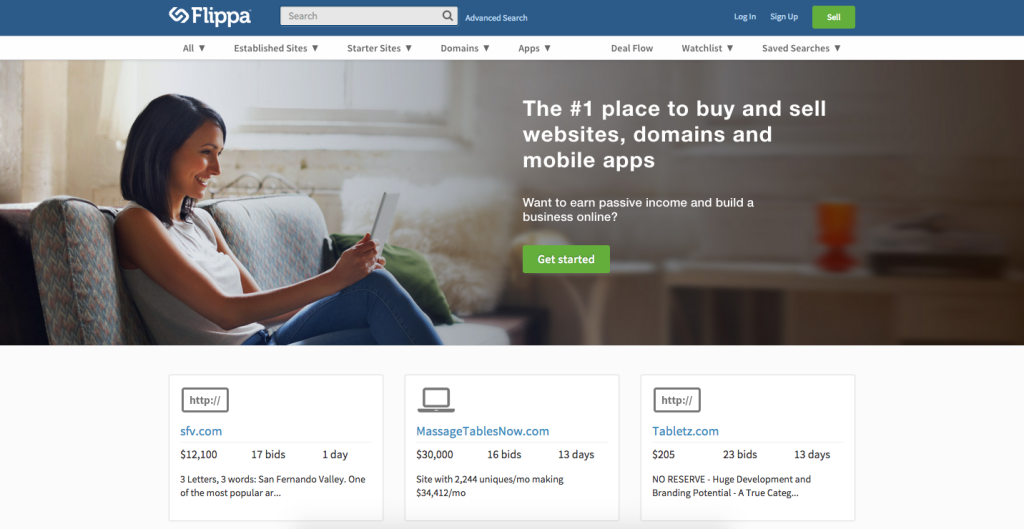 BuySellWebsite.com: BuySellWebsite specializes in established and start-up web sites. Established web sites cost $59 for a 2-week listing, or $99 for a two-month long listing (with a free one-month extension, for a total of three months) that includes being featured on the front page. Start-up sites cost the same, but don’t include the front page featuring.
BuySellWebsite.com: BuySellWebsite specializes in established and start-up web sites. Established web sites cost $59 for a 2-week listing, or $99 for a two-month long listing (with a free one-month extension, for a total of three months) that includes being featured on the front page. Start-up sites cost the same, but don’t include the front page featuring.
 Forums.DigitalPoint.com: A forum for all types of web development that allows you to post a site for sale as long as you have been a member for at least 14 days, do not have a reputation in the red and have a minimum of 25 posts throughout their boards.
Forums.DigitalPoint.com: A forum for all types of web development that allows you to post a site for sale as long as you have been a member for at least 14 days, do not have a reputation in the red and have a minimum of 25 posts throughout their boards.
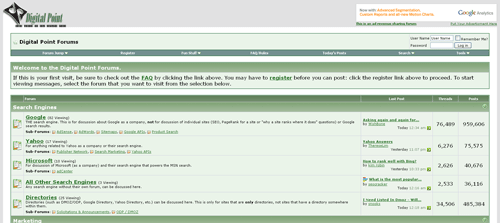 GeekVillage.com Forums: To list your site with the GeekVillage.com forums, it will cost you $9.95 per topic, and you must be a member in good standing with the forum.
GeekVillage.com Forums: To list your site with the GeekVillage.com forums, it will cost you $9.95 per topic, and you must be a member in good standing with the forum.
 InternetCompanyForSale.com: This site charges no commissions on the sales through their company, but they do have one time listing fees depending on the type of site you want to sell. Established sites pay $59.95 for list-til-you-sell. Start-up sites will cost you $39.95, and a Permanently Featured Listing, either for a established site or start-up, it will cost you $99 and will get you featured in their bi-weekly newsletter.
InternetCompanyForSale.com: This site charges no commissions on the sales through their company, but they do have one time listing fees depending on the type of site you want to sell. Established sites pay $59.95 for list-til-you-sell. Start-up sites will cost you $39.95, and a Permanently Featured Listing, either for a established site or start-up, it will cost you $99 and will get you featured in their bi-weekly newsletter.
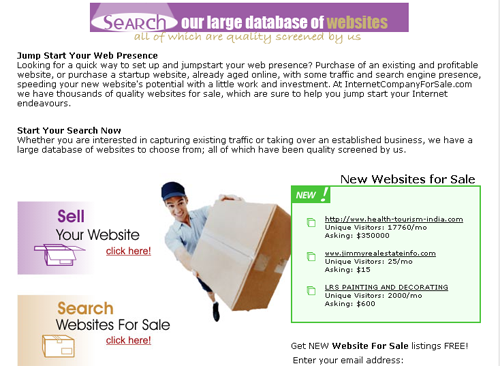 SiteIndeed.com: SiteIndeed provides basic listing ads for free for up to 90 days, but if you want to extend your listing past that they will charge you a fee based upon the number of days you choose. The site also provides featured listings that will give your site more prominent display for a fee, based on the number of days you wish to list it.
SiteIndeed.com: SiteIndeed provides basic listing ads for free for up to 90 days, but if you want to extend your listing past that they will charge you a fee based upon the number of days you choose. The site also provides featured listings that will give your site more prominent display for a fee, based on the number of days you wish to list it.
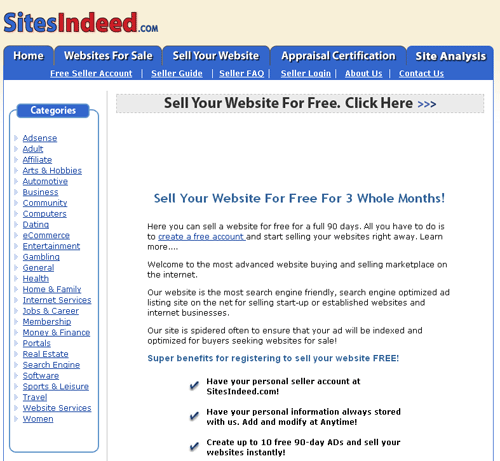 Talk.iWebTool.com: A forum dedicated to everything about developing your own web sites and domain names. It also has an active sales area for selling domain names, sites, scripts and more.
Talk.iWebTool.com: A forum dedicated to everything about developing your own web sites and domain names. It also has an active sales area for selling domain names, sites, scripts and more.
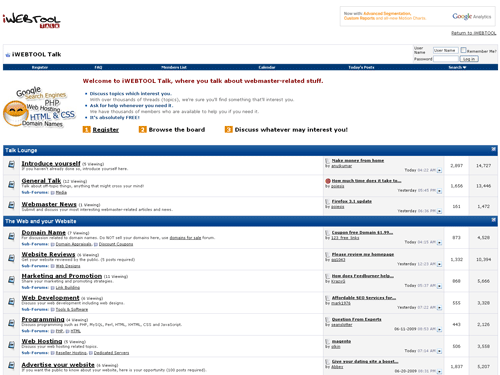 Webmaster-Talk.com Marketplace: A general sales site that allows you to do everything from promoting your services to selling your established sites. General listing fees are free, but services such as promotions will cost you credits you purchase with the site. With auctions, you can select to feature it on the main page, highlight it, etc., and those services will cost you a few dollars each.
Webmaster-Talk.com Marketplace: A general sales site that allows you to do everything from promoting your services to selling your established sites. General listing fees are free, but services such as promotions will cost you credits you purchase with the site. With auctions, you can select to feature it on the main page, highlight it, etc., and those services will cost you a few dollars each.
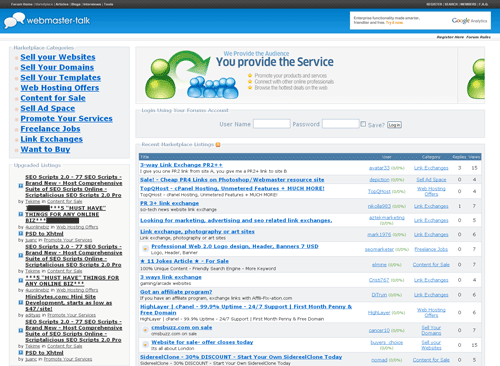 Which site is your favorite for selling your excess web sites?
Which site is your favorite for selling your excess web sites?
Frequently Asked Questions (FAQs) About Selling Your Website
What are the key factors that determine the value of my website?
The value of a website is determined by several factors. These include the website’s traffic, revenue, profit margins, the industry it operates in, its growth potential, and its operational complexity. A website with high traffic and revenue, low operational complexity, and significant growth potential will generally be valued higher. Additionally, the website’s age, its SEO ranking, the quality of its content, and its customer base can also influence its value.
How can I increase the value of my website before selling it?
There are several strategies to increase the value of your website before selling it. Improving the website’s SEO ranking, increasing its traffic, and boosting its revenue can significantly enhance its value. Additionally, simplifying its operations, improving its design, and expanding its customer base can also increase its value. It’s also beneficial to document all processes and systems to make the transition easier for the new owner.
How long does it take to sell a website?
The time it takes to sell a website can vary widely depending on the website’s value, its attractiveness to buyers, and the platform you use to sell it. On average, it can take anywhere from a few weeks to several months to sell a website. High-value websites may take longer to sell as they require finding a buyer with the necessary funds.
What are the risks involved in selling my website?
Selling a website comes with several risks. These include the risk of not getting a fair price, the risk of the sale falling through at the last minute, and the risk of confidential information being disclosed during the sale process. To mitigate these risks, it’s important to properly value your website, vet potential buyers, and use a secure platform for the sale.
How can I find potential buyers for my website?
There are several platforms and strategies to find potential buyers for your website. These include online marketplaces like Flippa and Empire Flippers, brokerage services, and networking in industry forums and social media groups. Additionally, reaching out to competitors or complementary businesses may also yield potential buyers.
What information should I prepare for potential buyers?
Potential buyers will typically want to see detailed information about your website’s traffic, revenue, expenses, and operations. This includes Google Analytics reports, profit and loss statements, and details about your website’s operations and processes. It’s also helpful to prepare information about your website’s growth potential and strategic advantages.
How can I ensure a smooth transition after the sale?
Ensuring a smooth transition after the sale involves providing the new owner with all necessary information and assistance. This includes transferring all digital assets, providing documentation on operations and processes, and offering post-sale support to help the new owner get up to speed.
What are the common mistakes to avoid when selling my website?
Common mistakes when selling a website include not properly valuing the website, not preparing adequate information for buyers, and not vetting potential buyers. Additionally, failing to ensure a smooth transition after the sale can lead to problems and disputes.
Can I sell a website that isn’t profitable?
Yes, it’s possible to sell a website that isn’t profitable. However, the value of the website will be significantly lower, and it may be harder to find a buyer. The website’s potential for profitability, its traffic, and other factors can still make it attractive to some buyers.
Should I use a broker to sell my website?
Using a broker to sell your website can have several advantages. A broker can help you properly value your website, find potential buyers, and handle negotiations. However, brokers also charge a commission, so it’s important to weigh the costs and benefits.

